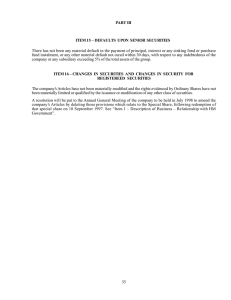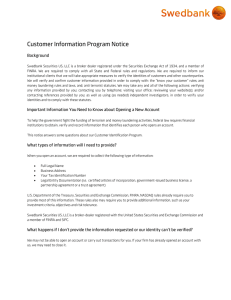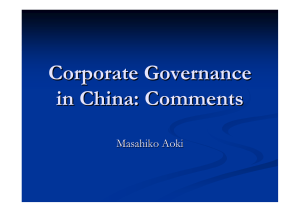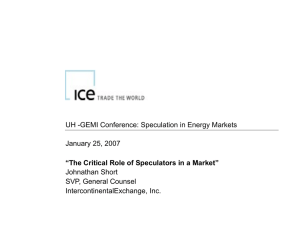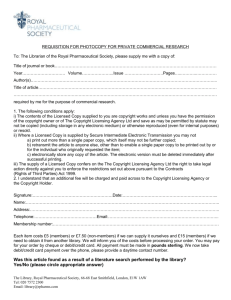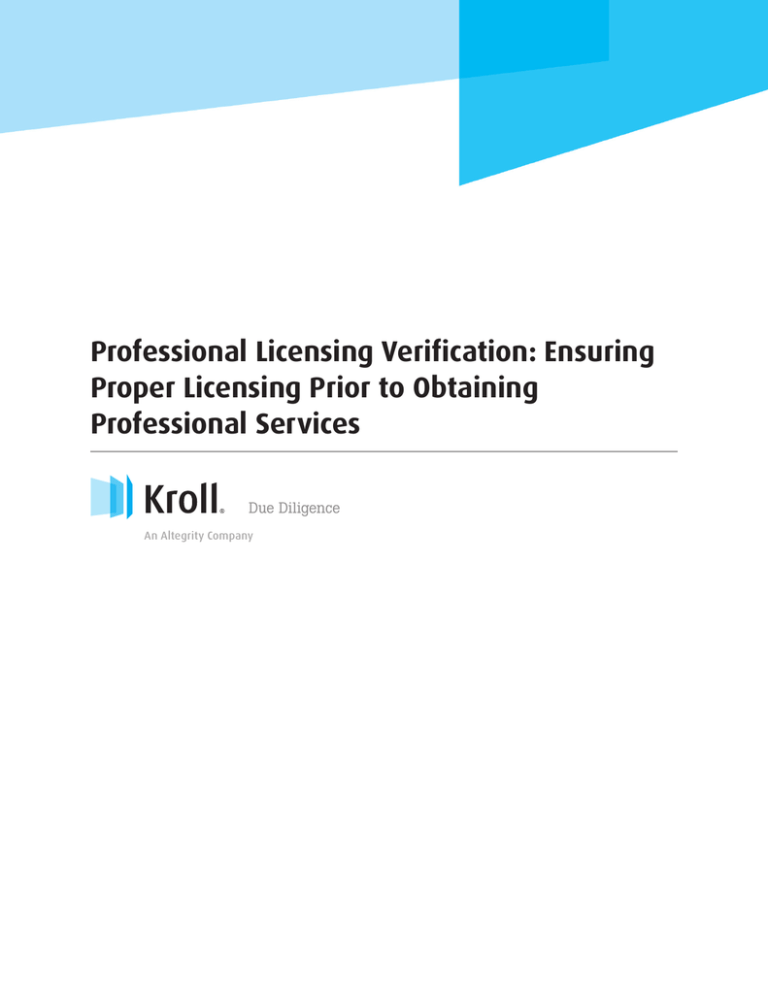
Professional Licensing Verification: Ensuring
Proper Licensing Prior to Obtaining
Professional Services
Due Diligence
An Altegrity Company
Professional Licensing Verification: Ensuring Proper
Licensing Prior to Obtaining Professional Services
When seeking professional services from licensed individuals or firms, it is important to conduct proper due
diligence research to determine that these individuals and firms are properly licensed to practice in the
industry and jurisdiction in which they operate. Federal and state agencies provide oversight and regulation
of professional service industries such as securities, medical services, and legal services. Assessing the status
and disciplinary history of licensed individuals is of key importance, as there have been many cases of
fraudulent wrongdoing by licensed individuals as well as by those seeking to hold such professional licenses.
»» In April 2005, Wichita, Kansas, stockbroker Ronald Reeves was sentenced for two felony counts of
securities fraud and one felony count of selling unregistered securities. An investigation by the Office
of the Kansas Securities Commissioner reportedly revealed that Reeves sold his own personal shares
of stock that were not properly registered with the Office of the Securities Commissioner. As part of the
plea agreement, Reeves reportedly agreed to enter into an administrative order with the Office of the
Securities Commissioner in which his securities license was revoked and he was permanently barred
from association with any broker-dealer or investment adviser in the state of Kansas. In this case,
investors could have contacted the Office of the Securities Commissioner to verify the investment products
that Reeves had purportedly registered for sale in Kansas and that he was licensed to sell securities.
»» In November 2006, defense attorney Frank M. Picl voluntarily agreed to be disbarred from practicing
law in the State of Illinois. Picl was sentenced to 10 years in prison after pleading guilty to three
counts of theft and three counts of financial exploitation of the elderly. Picl reportedly took money from
Alice Vargas from January 2003 until March 2005 while he was managing her affairs and nearly left
her penniless when she died at a nursing home. Prosecutors were made aware of his actions after
a manager at Vargas’ retirement community called state officials because checks drawn from the
elderly woman’s accounts bounced. While Picl agreed as part of the plea agreement to have his name
withdrawn from the Illinois Attorney Registration and Disciplinary Commission list of active practicing
attorneys, a prior search of his attorney record would have revealed a censure dated May 22, 2003, only
four months after he began taking money from Vargas’ accounts.
In the absence of government oversight, self-regulatory organizations or non-governmental regulatory
organizations have been created and sometimes delegated authority by a federal agency to enforce industry
standards and requirements, as well as to regulate its members. In an effort to strengthen the accounting
industry after the Enron scandal, the Public Company Accounting Oversight Board (PCAOB) was created by
the Sarbanes-Oxley Act of 2002 to oversee the auditors of public companies in order to protect the interests
of investors and to further the preparation of fair and independent audit reports. Interested parties seeking
accounting firms or individuals to conduct audits can check not only their state’s Accountancy Board for
proper licensing, but also the PCAOB’s list of disciplinary proceedings containing information on individuals
and firms that have been sanctioned by the board. For example, in December 2007, the PCAOB barred
Stephen J. Nardi, a certified public accountant licensed in Pennsylvania, from being an associated person of
a registered public accounting firm due to an investigation in which Nardi was found violating PCAOB rules
and standards in connection with alterations of documentation relating to an audit.
Another self-regulatory body is the Financial Industry Regulatory Authority (FINRA), a non-governmental
regulatory body for the securities industry, which is responsible for governing business between brokers,
dealers, and the investing public. Approved in July 2007 by the U.S. Securities and Exchange Commission,
FINRA was created through the consolidation of the National Association of Securities Dealers (NASD) and the
New York Stock Exchange’s member regulation, enforcement, and arbitration operations. FINRA’s BrokerCheck
provides information about current and former FINRA-registered firms. It also provides information about
-1-
individuals who are currently FINRA-registered or have been registered with FINRA within the last two years.
»» In December 2006, two licensed stockbrokers, Damascus Lee and Ian Bynoe, were charged with
multiple felonies, including grand larceny, scheme to defraud, and money laundering. The two brokers
reportedly created Wyoming-incorporated Vanguard Development and Management, a fraudulent
real estate development company, and sold fake stock by cold-calling clients and alleging that the
company had tremendous growth and was endorsed by the brokerage firm that they worked for, JP
Turner. Prosecutors did not link the brokerage firm to the scheme, and the firm fully cooperated with
investigators who were referred the case by the National Association of Securities Dealers, FINRA’s
predecessor. The two stockbrokers reportedly stole about US$500,000 from clients for personal use and
faced up to 15 years in jail; according to one report, Lee had his license to sell securities revoked by
the NASD. An investor who was fraudulently misled sought to retrieve her funds through arbitration
with the NASD. However, had investors used FINRA’s (formerly known as NASD) BrokerCheck database
to review Lee’s record at the time, they would have found that Lee had worked at 15 different New York
brokerage firms in the past 10 years, and disclosure information was available for him.
However, it has been reported that FINRA deletes hundreds of complaints at the request of brokers (its own
regulated members) who reach settlements with clients, which can mislead investors into believing they may
be dealing with somebody with a clean record. As noted in the previous case, broker Damascus Lee allegedly
had his licensed revoked by the NASD. However, a subsequent search of BrokerCheck found no records for Lee or
his associate Bynoe. In addition, one must be aware that records of brokers who have not been registered with
FINRA for more than two years are not available on BrokerCheck, which can allow individuals with an adverse
track record to enter another industry without having their records available online. To ensure proper compliance,
the following basic steps/tips are useful in order to determine if an individual or firm is properly licensed to
practice and/or has no disciplinary history:
»» In addition to checking with self-regulatory bodies for proper licensing, inquire with the appropriate state
or federal agencies, such as the state securities office or state bar association, for disciplinary history and
licensing records.
»» Check the regulatory licensing bodies of the various jurisdictions/states in which individuals or firms
have currently/previously operated for a track record of performance and proper licensing.
»» Even firms with global operations are subject to an international or foreign regulatory licensing body,
such as the North American Securities Administrators Association, a voluntary association whose
membership consists of 67 state, provincial, and territorial securities administrators in the United
States, Canada, and Mexico, or the United Kingdom’s Financial Services Authority, which is responsible
for the regulation of the United Kingdom’s financial system.
Performing these basic checks prior to obtaining the services of a professional individual/firm will help curb
unwanted losses as a result of fraudulent wrongdoing by deceptive individuals.
For more information, call, email or visit us online.
877.230.9082
edd-contactus@kroll.com
www.kroll.com
Certain Altegrity companies provide investigative services. State licensing information can be found at www.altegrity.com/compliance.
Copyright © 2011 Kroll. All rights reserved.
Professional Licensing Verification WP 14 040811PR


